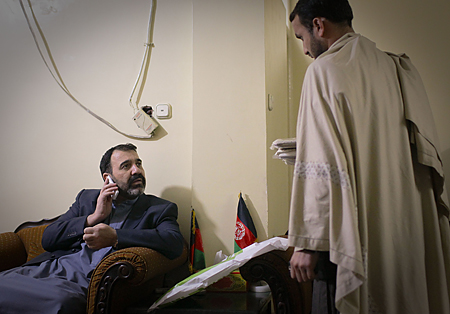
Ahmad Wali Karzai, left, half brother of Afghan President Hamid Karzai talks to an aid during an interview with the Associated Press at his house in Kandahar, February 12, 2011. (Photo: Anja Niedringhaus - AP)
It is no small irony that his morning’s assassination of Ahmed Wali Karzai, the Afghan president’s half brother, politician, and perennial thorn in the side to the U.S. counter-insurgency effort, could not have come at a worse time. For years U.S. and NATO officials have made their displeasure over his outsize political swaggering, Mafioso-like behavior and suspected connections to the drug trade well known. But over the past few months, as efforts to reach a negotiated settlement with the Taliban took root, the steady flow of leaks has slowed to a trickle. As head of one of the south’s most influential Pashtun tribes as well as the Provincial Council, Karzai had an important role to play in reconciliation talks with the Taliban and their sponsors in neighboring Pakistan. His loss now will have a profoundly destabilizing effect on the southern provinces, just as U.S. and Afghan counterinsurgency forces have started gaining traction.
Details of the assassination—point blank shots to the head and chest— are not entirely clear. It appears to have been at the hands of long-time family friend and director of security, Sardar Mohammed, who was also killed in the ensuing scuffle. The Taliban immediately claimed responsibility, stating that they had planted a sleeper agent in his security detail. If true, Karzai’s death would be the latest in a string of assassinations targeting prominent community leaders, not to mention a more troubling exposure of security flaws. More likely, however, his death is the result of ongoing power struggles in the southern capital in which the Taliban could have played a part.
Karzai has long been a controversial figure, presiding over Kandahar like a mafia don, peddling influence, dispensing American government largesse to supporters, and cracking down violently on his enemies. His power and connections to the President gained him influence and access to U.S. military contracts. According to diplomatic memos released by Wikileaks last year, he once told a senior U.S. diplomat that he, not the governor, was “the most powerful official in Kandahar and could deliver whatever is needed.” But his power and income were not limited to contracts. He is widely suspected of heading up a narcotics trafficking syndicate worth millions, if not billions of dollars a year. Another leaked diplomatic cable lamented that, “While we must deal with AWK as the head of the Provincial Council, he is widely understood to be corrupt and a narcotics trafficker…. AWK highlights one of our major challenges in Afghanistan. How to fight corruption and connect the people to their government, when the key government officials are themselves corrupt.”
As one former NATO official with years of experience in Kandahar told my colleague Tim McGirk in 2010, “You have essentially a criminal enterprise in the guise of government, using us [NATO forces] as its enforcing arm.” As a result, said the official, who asked not to be identified, “the people are turning to the Taliban as the only means of protection and outlet for their anger.” But as a feared, if not exactly respected, regional powerbroker, Karzai also had the ability to settle land disputes, grant development contracts, dispense humanitarian aid and wield a complex arsenal of carrots and sticks in order to get Kandahar’s fractious tribes into line. And that is why international military officials and U.S. diplomats had little choice but to deal with him.
As any student of the American urban drug wars in the 1980s well knows, the death of a kingpin most often unleashes a spasm of violence as would be successors vie for prominence. Kandahar will be no different. American and NATO officials may have secretly wished to be rid of such a toxic figure, but now that he is actually gone, they may think differently. Not only is his death bad for Afghan stability going forward, it will also have a serious impact on the U.S. military role in the south. As Time’s Mark Thompson writes in Battleland, whatever happens next, “There will be blood.”
Aryn Baker is TIME‘s Middle East Bureau Chief, based in Beirut. Find her on Twitter at @arynebaker. You can also continue the discussion on TIME’s Facebook page and on Twitter at @TIMEWorld.

